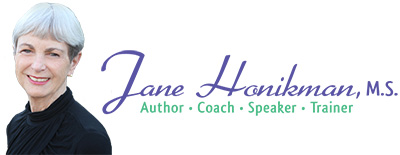By Jane I. Honikman
Embrace the Gap in your Past
Childhood curiosity got me interested in exploring family history. I was intrigued that my father’s family has been in America since the late 1690s. It was exciting to learn I descend from survivors of both the Revolutionary and Civil Wars. Father proudly boasted about his lineage and I pleased him by asking lots of questions. He had photo albums and family trees.
On the other hand, I irritated my mother by my fascination with her heritage. Her parents were immigrants to America in the 1890s. Grandmother came from Russia and grandfather from Germany. There were few heirlooms or photos. My eagerness to dig into the past was emotional. What happened to our family during the Holocaust? I discovered there were family mysteries and I wanted to solve them. The strategies I used will help you too.
1. Identify your family truths: What facts do you already know about your ancestors? There are clues that surround you. The color of your eyes and hair, your parent’s hobbies, the family photos on the walls or buried in boxes, birth and marriage certificates, and the stories you’ve heard from childhood. Take note of what is known, write it down and treat them as treasures.
2. Uncover the mysterious gaps in family lore: Your last name sounds German yet you’ve been told that your grandparents came from Spain. Family history detectives are individuals who question the stories and seek facts. They look for more information rather than rely on assumptions or rumors. A misspelled name in a census record or an overlooked signature on the back of a photograph can change history.
3. Ask challenging questions: Everyone has a paper trail. Researching your past is easy if you start with strategy number one. Use existing clues. Prior to computers, family fact searching was daunting. While information has always been around, there is now an avalanche of data available online. The facts can bring guidance to answering unsolved family questions and mysteries.
4. Move beyond the computer: Genealogy is a popular and satisfying hobby. There is a psychological component why some individuals feel passionate and others don’t care. The gap in one’s past may be rooted in a trauma, an embarrassment or a curiosity. The opportunity to travel and visit a country of origin can be exciting, satisfying and life changing. The idea of walking into the past offers insight into family beliefs and behaviors. There is comfort in these discoveries.
5. Seek out the experts: Encouragement from others is both validating and important in your family history search. Before I enrolled in genealogy courses, I hired professionals to do research. It was money well spent. The first skill I learned was to document family stories through interviews. Although my mother was reluctant, I captured her voice on audio tape. Now that she is no longer alive, It provides a comfort to hear her laughing as she describes her childhood home and experiences.
Our family mystery was derived from a set of six small black and white photos with fancy German handwriting on the back. They puzzled and inspired me. One had the date of 1938 and the word Palestine. Another identified my grandfather’s brother as a Cantor in Berlin. Who were these people and what happened to them?
This gap in my knowledge of my past upset me. I embraced the challenge to find their fate. What emerged has been life affirming. I have discovered living relatives who now embrace me. My family history gap has been closed, and a wound healed.


